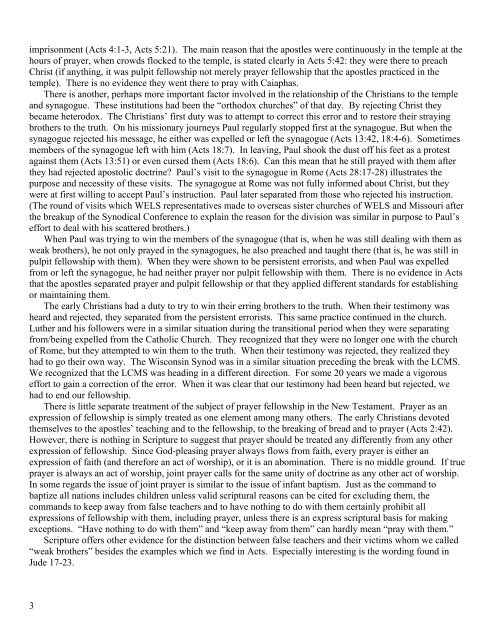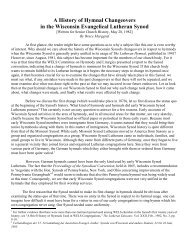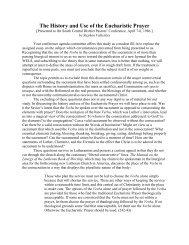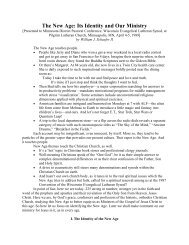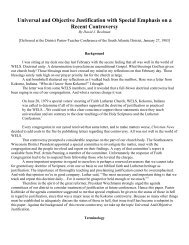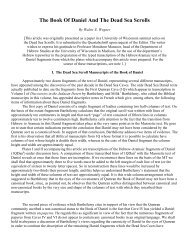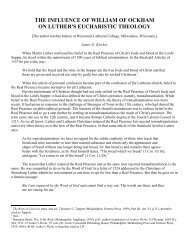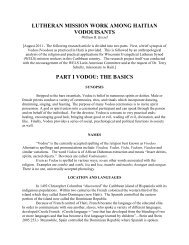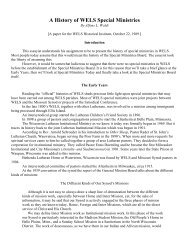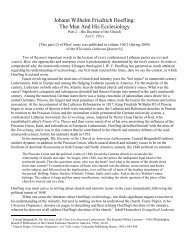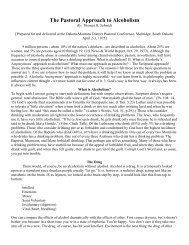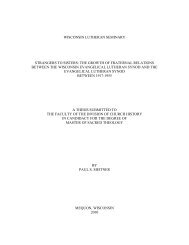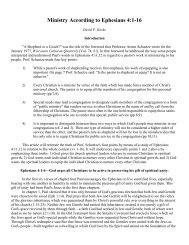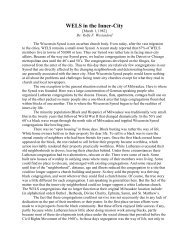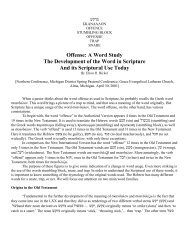The Synodical Conference and Prayer Fellowship - Wisconsin ...
The Synodical Conference and Prayer Fellowship - Wisconsin ...
The Synodical Conference and Prayer Fellowship - Wisconsin ...
Create successful ePaper yourself
Turn your PDF publications into a flip-book with our unique Google optimized e-Paper software.
imprisonment (Acts 4:1-3, Acts 5:21). <strong>The</strong> main reason that the apostles were continuously in the temple at the<br />
hours of prayer, when crowds flocked to the temple, is stated clearly in Acts 5:42: they were there to preach<br />
Christ (if anything, it was pulpit fellowship not merely prayer fellowship that the apostles practiced in the<br />
temple). <strong>The</strong>re is no evidence they went there to pray with Caiaphas.<br />
<strong>The</strong>re is another, perhaps more important factor involved in the relationship of the Christians to the temple<br />
<strong>and</strong> synagogue. <strong>The</strong>se institutions had been the “orthodox churches” of that day. By rejecting Christ they<br />
became heterodox. <strong>The</strong> Christians’ first duty was to attempt to correct this error <strong>and</strong> to restore their straying<br />
brothers to the truth. On his missionary journeys Paul regularly stopped first at the synagogue. But when the<br />
synagogue rejected his message, he either was expelled or left the synagogue (Acts 13:42, 18:4-6). Sometimes<br />
members of the synagogue left with him (Acts 18:7). In leaving, Paul shook the dust off his feet as a protest<br />
against them (Acts 13:51) or even cursed them (Acts 18:6). Can this mean that he still prayed with them after<br />
they had rejected apostolic doctrine? Paul’s visit to the synagogue in Rome (Acts 28:17-28) illustrates the<br />
purpose <strong>and</strong> necessity of these visits. <strong>The</strong> synagogue at Rome was not fully informed about Christ, but they<br />
were at first willing to accept Paul’s instruction. Paul later separated from those who rejected his instruction.<br />
(<strong>The</strong> round of visits which WELS representatives made to overseas sister churches of WELS <strong>and</strong> Missouri after<br />
the breakup of the <strong>Synodical</strong> <strong>Conference</strong> to explain the reason for the division was similar in purpose to Paul’s<br />
effort to deal with his scattered brothers.)<br />
When Paul was trying to win the members of the synagogue (that is, when he was still dealing with them as<br />
weak brothers), he not only prayed in the synagogues, he also preached <strong>and</strong> taught there (that is, he was still in<br />
pulpit fellowship with them). When they were shown to be persistent errorists, <strong>and</strong> when Paul was expelled<br />
from or left the synagogue, he had neither prayer nor pulpit fellowship with them. <strong>The</strong>re is no evidence in Acts<br />
that the apostles separated prayer <strong>and</strong> pulpit fellowship or that they applied different st<strong>and</strong>ards for establishing<br />
or maintaining them.<br />
<strong>The</strong> early Christians had a duty to try to win their erring brothers to the truth. When their testimony was<br />
heard <strong>and</strong> rejected, they separated from the persistent errorists. This same practice continued in the church.<br />
Luther <strong>and</strong> his followers were in a similar situation during the transitional period when they were separating<br />
from/being expelled from the Catholic Church. <strong>The</strong>y recognized that they were no longer one with the church<br />
of Rome, but they attempted to win them to the truth. When their testimony was rejected, they realized they<br />
had to go their own way. <strong>The</strong> <strong>Wisconsin</strong> Synod was in a similar situation preceding the break with the LCMS.<br />
We recognized that the LCMS was heading in a different direction. For some 20 years we made a vigorous<br />
effort to gain a correction of the error. When it was clear that our testimony had been heard but rejected, we<br />
had to end our fellowship.<br />
<strong>The</strong>re is little separate treatment of the subject of prayer fellowship in the New Testament. <strong>Prayer</strong> as an<br />
expression of fellowship is simply treated as one element among many others. <strong>The</strong> early Christians devoted<br />
themselves to the apostles’ teaching <strong>and</strong> to the fellowship, to the breaking of bread <strong>and</strong> to prayer (Acts 2:42).<br />
However, there is nothing in Scripture to suggest that prayer should be treated any differently from any other<br />
expression of fellowship. Since God-pleasing prayer always flows from faith, every prayer is either an<br />
expression of faith (<strong>and</strong> therefore an act of worship), or it is an abomination. <strong>The</strong>re is no middle ground. If true<br />
prayer is always an act of worship, joint prayer calls for the same unity of doctrine as any other act of worship.<br />
In some regards the issue of joint prayer is similar to the issue of infant baptism. Just as the comm<strong>and</strong> to<br />
baptize all nations includes children unless valid scriptural reasons can be cited for excluding them, the<br />
comm<strong>and</strong>s to keep away from false teachers <strong>and</strong> to have nothing to do with them certainly prohibit all<br />
expressions of fellowship with them, including prayer, unless there is an express scriptural basis for making<br />
exceptions. “Have nothing to do with them” <strong>and</strong> “keep away from them” can hardly mean “pray with them.”<br />
Scripture offers other evidence for the distinction between false teachers <strong>and</strong> their victims whom we called<br />
“weak brothers” besides the examples which we find in Acts. Especially interesting is the wording found in<br />
Jude 17-23.<br />
3


